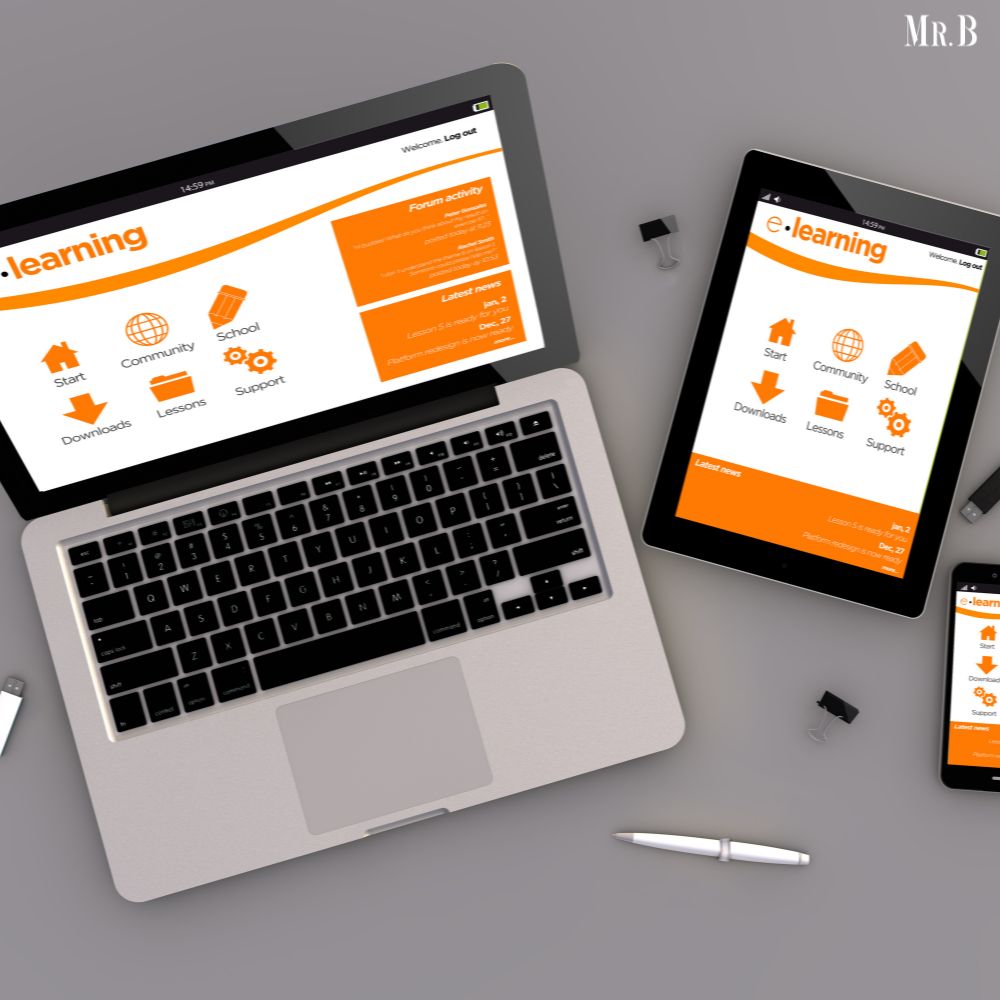The educational landscape is changing dramatically in the fast-paced digital world of today. The only way to learn is no longer in traditional classroom environments. With the development of technology, leading educational platforms have become extremely effective instruments that provide students unparalleled access to a wide range of chances and resources. This article explores the features, advantages, and implications of leading educational platforms for the future of education.
The Rise of Top Educational Platforms
The proliferation of the internet and advancements in technology have paved the way for the rise of it. These platforms offer a diverse range of courses, from primary education to advanced professional development, making learning accessible to people of all ages and backgrounds. Whether you are a student, a professional seeking to upskill, or simply a curious learner, there is a platform tailored to meet your needs.
Accessibility and Flexibility
One of the most significant advantages of platforms is their accessibility. Geographical barriers are no longer an issue, as learners can access courses from anywhere in the world. This flexibility allows individuals to learn at their own pace and on their schedule. Whether you are a working professional or a stay-at-home parent, you can find a platform that fits seamlessly into your routine.
Diverse Course Offerings
It offer a wide range of courses, covering subjects from mathematics and science to arts and humanities. These platforms collaborate with renowned universities, colleges, and industry experts to provide high-quality content. Learners can choose from free courses, paid courses, and even degree programs, depending on their goals and preferences.
Interactive Learning Experience
Unlike traditional classrooms, top educational platforms leverage technology to create an interactive learning experience. Features such as video lectures, quizzes, discussion forums, and live sessions enhance engagement and facilitate better understanding. Gamification elements, like badges and leaderboards, motivate learners to stay committed and achieve their learning objectives.
Leading Top Educational Platforms
Several top educational platforms have gained prominence due to their innovative approaches and comprehensive offerings. Here, we explore some of the most influential platforms that are transforming education.
1. Coursera
Coursera is one of the educational platforms that has revolutionized online learning. It partners with top universities and organizations worldwide to offer courses in various disciplines. Learners can enroll in individual courses, specializations, or even degree programs. Coursera’s interactive interface and high-quality content make it a preferred choice for millions of learners globally.
2. Udemy

Udemy is another leading platform known for its extensive course catalog. Unlike traditional academic institutions, Udemy allows experts from various fields to create and share their courses. This democratized approach ensures that learners have access to a diverse range of topics and teaching styles. Udemy’s affordability and frequent discounts make it an attractive option for budget-conscious learners.
3. edX
Founded by Harvard and MIT, edX is a non-profit platform that offers high-quality courses from top universities and institutions. It is renowned for its rigorous academic content and commitment to accessibility. edX provides learners with the opportunity to earn certificates, micro-credentials, and even full degrees. Its focus on quality and credibility sets it apart as one of the top educational platforms.
4. Khan Academy
Khan Academy is a non-profit educational organization that aims to provide free, world-class education to anyone, anywhere. Its extensive library of video lessons covers subjects ranging from math and science to history and economics. Khan Academy’s personalized learning dashboard helps students track their progress and tailor their learning experience to their individual needs.
5, LinkedIn Learning
Formerly known as Lynda.com, LinkedIn Learning is a platform designed for professionals seeking to enhance their skills and advance their careers. It offers courses in business, technology, and creative fields, taught by industry experts. The integration with LinkedIn allows learners to showcase their completed courses on their profiles, increasing their visibility to potential employers.
The Impact of Top Educational Platforms on Learning
The influence is extends beyond individual learners; it is reshaping the entire education ecosystem. Here are some key ways in which these platforms are making a difference.
1. Bridging the Gap in Education
Top educational platforms play a crucial role in bridging the educational gap, particularly in underserved communities. They provide access to quality education resources that may otherwise be unavailable. This democratization of education empowers individuals to pursue their aspirations and contribute to their communities’ development.
2. Lifelong Learning and Continuous Improvement
In today’s rapidly changing world, the concept of lifelong learning is more important than ever. Top educational platforms encourage a culture of continuous improvement by offering courses that cater to evolving industry demands. Professionals can stay updated with the latest trends and acquire new skills to remain competitive in their fields.
3. Personalized Learning Paths

One-size-fits-all approaches to education are becoming obsolete. It leverage data and analytics to create personalized learning paths for each student. Adaptive learning technologies assess learners’ strengths and weaknesses, recommending tailored content to enhance their understanding and retention.
4. Collaboration and Networking Opportunities
Many top educational platforms facilitate collaboration and networking among learners. Discussion forums, group projects, and live sessions allow students to interact with peers from diverse backgrounds. These interactions foster a sense of community and provide valuable networking opportunities that can benefit learners in their personal and professional lives.
5. Quality and Credibility
As the popularity of it grows, so does the emphasis on quality and credibility. Many platforms partner with accredited institutions and industry leaders to ensure that their courses meet rigorous academic and professional standards. Learners can trust that the credentials they earn from these platforms hold value and recognition in the job market.
Future Trends in Top Educational Platforms
The landscape of top educational platforms is continually evolving, driven by technological advancements and changing learner needs. Here are some trends that are likely to shape the future of online education.
1. Artificial Intelligence and Machine Learning
Artificial Intelligence (AI) and Machine Learning (ML) are poised to revolutionize it. These technologies can analyze vast amounts of data to provide personalized recommendations, automate administrative tasks, and create adaptive learning experiences. AI-powered chatbots and virtual tutors can offer real-time support and guidance to learners.
2. Virtual and Augmented Reality
Virtual Reality (VR) and Augmented Reality (AR) have the potential to create immersive learning experiences. It is exploring ways to incorporate VR and AR into their courses, allowing learners to engage with content in new and exciting ways. For example, medical students can practice surgeries in a virtual environment, and history students can explore ancient civilizations through AR simulations.
3. Gamification and Engagement

Gamification elements are increasingly being integrated into top educational platforms to boost engagement and motivation. Points, badges, leaderboards, and challenges make learning more enjoyable and encourage learners to achieve their goals. This trend is particularly effective in keeping younger students and those with shorter attention spans engaged.
4. Micro-credentials and Skill-Based Learning
The demand for skill-based learning and micro-credentials is on the rise. It is offering short, focused courses that allow learners to acquire specific skills quickly. These micro-credentials are recognized by employers and can be stacked to form larger qualifications, providing a flexible and efficient pathway to career advancement.
5. Global Collaboration and Partnerships
Collaboration among top educational platforms, universities, and industry leaders is expected to increase. These partnerships will lead to the development of more comprehensive and interdisciplinary courses, combining academic rigor with practical industry insights. This global collaboration will further enhance the quality and relevance of online education.
Conclusion
Leading educational platforms have completely changed the way we study, increasing accessibility, flexibility, and engagement. By providing a wide variety of courses and cutting-edge learning opportunities, platforms like Coursera, Udemy, edX, Khan Academy, and LinkedIn Learning have raised the bar for online education. These platforms will become more and more important in determining how education is shaped in the future as technology develops.
Leading educational platforms have an influence that goes beyond just helping individual students. They also help to democratize education, close the gap in underprivileged communities, and promote a culture of lifelong learning. Top educational platforms have a bright and exciting future ahead of them with trends like artificial intelligence (AI), virtual reality (VR), gamification, and global cooperation.
Curious to learn more? Explore this Article on: Mr. Business Magazine







